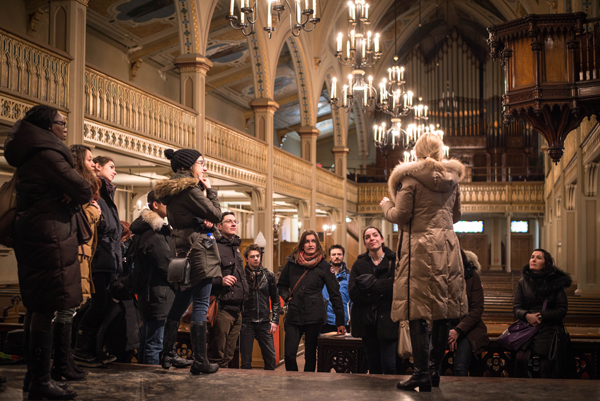
By Zoey Tung
Built in 1861, l’Église St-Joseph, in Montreal’s Little-Burgundy neighbourhood, is one of the oldest Catholic churches in Montreal with a heritage value close to that of the Oratoire St-Joseph. Starting this summer, the church will undergo a transformation into The Salon 1861, which will host the Laboratory of Urban Culture. This Quartier de l’innovation project will remain a fixture in the neighbourhood while becoming a new creative ecosystem. QI, a McGill and École de technologies supérieures initiative, has been working in partnership with Gestion Immobilière Quo Vadis to preserve and find a new purpose for the now-vacant l’Église St-Joseph.
The idea for the Laboratory of Urban Culture emerged from a study mandated by QI in 2012 to study the arts and cultural needs in the district. Professor Will Straw, Director of the McGill Institute for the Study of Canada, reached a conclusion following the study that, the community needed “a YMCA of culture,” or a neutral space. The Laboratory of Urban Culture will be a place in the community where academia, arts and culture intersect. The Laboratory of Urban Culture is establishing an accessible link between different stakeholders to promote arts and culture.
Coincidentally, around the time the study reached its conclusion, Natalie Voland, President of Gestion Immobilière Quo Vadis, had just purchased the church, which happened to be located in the QI district. Initially the church was purchased with an eye to convert it into condominiums, but after seeing the priceless value of the architecture, Voland sought ideas to maintain its heritage. In Voland’s search for ways to preserve the Église St-Joseph, she was put into contact with Isabelle Péan, Project Director of QI at McGill. Péan had learned of the purchase and met Voland to present the concept of the Laboratory of Urban Culture. Soon after, a collaboration was established between QI and Quo Vadis to host the Laboratory of Urban Culture within the Église St-Joseph, which will now be called the Salon 1861.
The Salon 1861 will be a socially responsible project drawing on the synergy of diverse partners. The historically significant heritage building will be maintained and transformed into a modern representation still carrying out its intended purpose, a place for civic community, culture and collaboration. In the coming months, a McGill Arts doctoral student will finalize the programming of workshops, lectures and concerts in the Laboratory. The Laboratory will be an important aspect of the creative ecosystem, which will be established in the Salon 1861. Other elements of this ecosystem include an art gallery, event spaces and a co-working space in the church’s basement targeted at social economy and arts entrepreneurship.
Students will have a variety of opportunities to get involved with the Laboratory and the Salon 1861. Currently, Mark Ramsey, a graduate student in architecture from McGill, is working with Quo Vadis on the legacy and heritage work of the church before reconstruction begins. More internships and projects for students are currently being established within this framework. Essentially, the Salon 1861 will become an ecosystem where different components will mutually complement and benefit the community.
“The concept of the Salon 1861 has really been inspired by the QI’s vision,” Voland said. “The Salon 1861 will be at the heart of the community and will be a real destination for cultural and social innovation in the district.”
The QI is an innovative ecosystem located in Montreal’s historic Southwest district – Griffintown, Saint-Henri, Petite Bourgogne and Pointe Saint-Charles. It aims to increase collaboration between academia, the private sector, and the community, as well as encourage research and industrial projects for social and cultural innovation. QI seeks to address needs and face real challenges, in order to improve the quality of life in its district. Since June 2013, the QI has developed into a non-profit organization that continues to develop impactful projects for the district.
